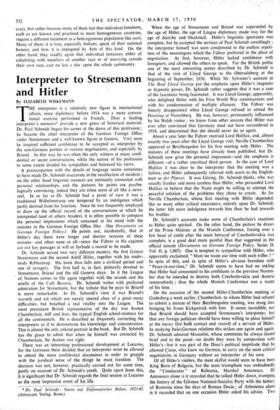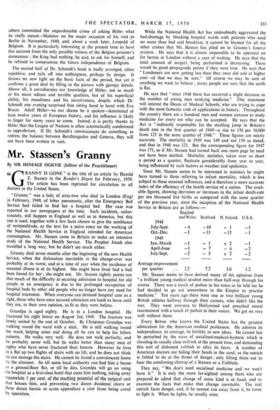Interpreter to Stresemann
and Hitler
By ELIZABETH WISKEMANN
THE interpreter is a relatively new figure in international affairs, since diplomacy before 1914 was a more conven- tional exercise performed in French. Thus a leading interpreter's memoirs* provide a new genre of historical material. Dr. Paul Schmidt began his career at the dawn of this profession ; he became the chief interpreter of the German Foreign Office under Stresemann and a well-known figure at Geneva. Very soon he inspired sufficient confidence to be accepted as interpreter by the non-German partner in various negotiations, and especially by Briand. In this way he was often the only witness at many confi- dential or secret conversations, while the nature of his profession to some extent divided his sympathies and balanced his views.
A preoccupation with the details of language seems sometimes to have made Dr. Schmidt inaccurate in the recollection of incident ; on the other hand linguistic nuances are intimately connected with personal relationships, and the picture's he paints are psycho- logically convincing, indeed they are often most of all like a news- reel. In so far as Dr. Schmidt had a point of view it was a traditional Wilhelmstrasse one tempered by an indulgence which partly derived from his function. Since he was frequently employed to draw up the official record of the conversations at which he interpreted (and of others besides), it is often possible to compare the personal impressions which remained in his mind with the minutes in the German Foreign Office files. (See Documents on German • Foreign Policy.) He points out, incidentally, that in Hitler's day there were longer and shorter versions of these minutes—and often none at all—since the Fiihrer in his caginess cut out key passages at will or forbade a record to be made.
Dr. Schmidt served two very different masters, the first Gustav Stresemann and the second Adolf Hitler, together with his under-. study Ribbentrop. His book thus falls into a civilised period and one of savagery. The first half is, in fact, primarily devoted to Stresemann, Briand and the old Geneva days. In it the League of Nations comes to life again together with the sounds and the smells of the Café Bavaria. Dr. Schmidt writes with profound admiration for Stresemann, but the tribute that he pays to Briand is more remarkable. In Dr. Schmidt's view it was Briand's warmth and wit which not merely steered clear of a great many difficulties, but breathed -a real vitality into the League. The most prominent British representative of the day was Austen Chamberlain, stiff and lean, the typical English school-mistress for all the continentals. He is described as frequently correcting the interpreters as if to demonstrate his khowledge and concentration. This is almost the only unkind portrait in the book. But Dr. Schmidt has the grace to admit that when he himself was corrected by Chamberlain, Sir Austen was right.
There was an interesting professional development at Locarno, for the Germans there decided that an interpreter must be allowed to attend the more confidential discussions in order to grapple with the juridical sense of the thing he must translate. The decision was not, however, practically carried out for some time, partly on account of Dr. Schmidt's youth. Quite apart from this, it is significant that Dr. Schmidt regards the final session at Locarno as the most impressive event of his life.
• Dr. Paul Schmidt: Statist auf Di;lomatischer Biihne, 1923-45. (Athenaum Verlag. Bonn.) When the age of Stresemann and Briand was superseded by the age of Hitler, the age of League diplomacy made way for the age of diatribe and-blackmail. Hitler's linguistic ignoranCe was complete, but he accepted the services of Paul Schmidt unwillingly; the interpreter himself was soon condemned to the endless repeti- tion of the monologues which the Fiihrer preferred in the place of negotiation. At first, however, Hitler lacked confidence with foreigners, and allowed the others to speak. For the British public one of the most interesting scenes described by Dr. Schmidt is that of the visit of Lloyd George to the Obersalzberg at the beginning of September, 1936. While Mr. Sylvester's account in The Real Lloyd George put the emphasis upon Hitler's magnetic or hypnotic power, Dr. Ssbmidt rather suggests that it was a case of the fascinator being fascinated. It was Lloyd George, apparently, who delighted Hitler with his First World War reminiscences and with his condemnation of multiple alliances. The Fiihrer was bitterly disappointed when Lloyd George refused to attend the Parteitag at Nuremberg. He was, however, permanently influenced by his Welsh visitor ; we know from other sources that Hitler was ever after convinced that Germany need not have surrendered in 1918, and determined that she should never do so again.
About a year later the Fiihrer received Lord Halifax, and, almost exactly two years after the Lloyd George visit, Neville Chamberlain appeared at Berchtesgaden for his first meeting with Hitler. The minutes of these meetings have already been published, but Dr. Schmidt now gives the personal impression—and the emphasis is different—of a rather uncritical third person. In the case of Lord Halifax it was clear to the interpreter that the meeting was a failure, and Hitler subsequently referred with scorn to the English- man as der Pfarrer. It was Goring, Dr. Schmidt thinks; who was usually franker and more careless than Hitler, who persuaded Lord Halifax to believe that the Nazis might be willing to attempt the peaceful solution of the problems they chose to create. As for Neville Chamberlain, whose first meeting with Hitler depended, like so many other critical encounters, entirely upon Dr. Schmidt, the latter felt more indulgence towards him than he had towards his brother.
Dr. Schmidt's accounts make some of Chamberlain's reactions to Hitler quite spirited. On the other hand, the picture he draws of the Prime Minister at the Munich Conference, fussing over a few head of cattle after the main betrayal of Czechoslovakia was complete, is a good deal• more painful than that suggested in the official minute (Documents on German Foreign Policy, Series D, Vol. II, p. 1,007). One is tempted to sympathise with Hitler, who apparently exclaimed, " Must we waste our time with such trifles ? " In spite of this, and in spite of Hitler's obvious boredom with " Peace-in-our-time," Dr. Schmidt seems to have had no inkling that Hitler had announced to his confidants in the previous Novem- ber that he intended to destroy both Czechoslovakia and Austria remorselessly ; thus the whole Munich Conference was a waste of his time.
On the occasion of the second Hitler-Chamberlain meeting at Godesberg a week earlier, Chamberlain, to whom Hitler had refused to submit a minute of their Berchtesgaden meeting, was stung into bringing Sir Ivone'Kirkpatrick with him. It seems incredible, not that Briand should have accepted Stresemann's interpreter, but that any foreign politican should have been willing to place himself at the mercy (foil–both contact and record) of a servant of Hitler. In studying Italo-German relations this strikes one again and again. Dr. Schmidt admired Mussolini, whose comments he always found brief and to the point—no doubt they were by comparison with Hitler's—but it was tart of the Duce's political ineptitude that he allowed Ciano, who knew no German, to carry on the most critical negotiations in Germany without an interpreter of his own.
Of all Hitler's visitors, the most skilful would seem to have been King Boris of Bulgaria, but the most triumphant was undoubtedly the " Conducator " ' of Rdlnania, Marshal Antonescu. Of Antonescu alone is it recorded that he talked Hitler down, trumping the history of the 3Erman National-Socialist Party with the history of Rumania since the days of Roman Dacia ; of Antonescu alone is it recorded that on one occasion Hitler asked his advice. Two others committed the unpardonable crime of asking Hitler what he really meant—Molotov on the major pccasion of his visit to Berlin in November, 1940, and, about a week later, Leopold of Belgium. It is particularly interesting at the present time to have this account from the only possible witness of the Belgian prisoner's demeanour ; the King had nothing, he said, to ask for himself, and he refused to compromise the future independence of Belgium.
The second half of Dr. Schmidt's book is badly arranged, often repetitive, and tails off into nothingness, perhaps by design. It throws no new light on the basic facts of the period, but yet it confirms a great deal by filling in the picture with gossipy details. Above all, it corroborates our knowledge of Hitler, not so much of his more odious and terrible qualities, but of his superficial ability, his moodiness and his secretiveness, despite which Dr. Schmidt one evening surprised him sitting hand in hand with Eva Braun. Adolf Hitler—to our shame be it spoken—dominated at least twelve years of European history, and his influence is likely to linger for many years to come. Indeed, it is partly thanks to Hitler that the League of Nations is often automatically condemned to opprobrium. If Dr. Schmidt's reminiscences do something to redress the balance between Berchtesgaden and Geneva, they will not have been written in vain.



































 Previous page
Previous page